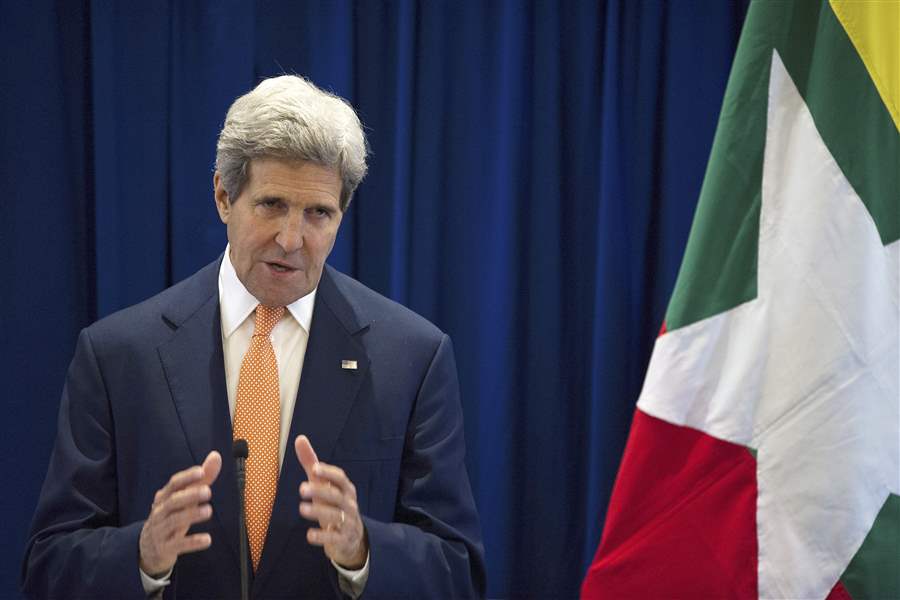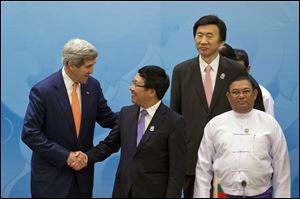
Kerry moves to head off yet another crisis and urges talks to ease South China Sea tensions
8/10/2014
U.S. Secretary of State John Kerry speaks during a press conference at the lake garden hotel, outside the venue of the 47th ASEAN Foreign Ministers' Meeting in Naypyitaw, Myanmar, Sunday, Aug. 10, 2014. (AP Photo/Nicolas Asfouri, Pool)
ASSOCIATED PRESS

U.S. Secretary of State John Kerry, left, shakes hands with Vietnam Foreign Minister Pham Binh Minh, second left, as South Korea's Foreign Minister Yun Byung Se, third left and Myanmar Foreign Minister Wunna Maung Lwin, foreground right watch as they prepare to pose for a group photo before commencing 4th East Asia Summit.
NAYPYITAW, Myanmar — Moving to head off yet another international crisis, U.S. Secretary of State John Kerry on Sunday urged China and its smaller neighbors to peacefully resolve mounting tensions over maritime disputes in Asian waters.
Speaking to the foreign ministers of China and the 10 members of the Association of Southeast Asian Nations, Kerry said it’s not enough to simply continue working on a long-delayed binding code of conduct for the South China Sea where many have competing claims to territory.
“While we all share the hope that ASEAN and China will accelerate negotiations on a meaningful code of conduct, we think the urgency of developments means that it is not enough simply to wait for that solution to arrive,” Kerry said. “Obvious dangers arise during waiting time. The claimants need to take steps now to lower the temperature.”
Kerry said he was concerned the lack of clarity regarding South China Sea claims has created uncertainty.
“And this uncertainty limits the prospect for a mutually agreeable resolution or equitable joint development arrangements. But let me be clear: We believe the obligation to clarify claims in keeping with international law applies to all claimants, not just China,” he said.
On Saturday, the Philippines, a U.S. treaty ally, offered an initiative that incorporated the American concept of a voluntary end to tension-producing activities. The U.S. is calling for a freeze in actions that change the status quo, such as seizing unoccupied islands and land reclamation.
In addition to the immediate voluntary cessation of provocative acts, Manila’s plan calls for the speedy conclusion of the code of conduct as well as long-term arbitration over disputes that would eventually resolve the claims under the U.N. Law of the Sea.
At a news conference Sunday, Kerry told reporters that the U.S. freeze proposal “is a way of actually locking into place the very promises that people have already made.”
Kerry brushed aside Chinese resistance, noting that the U.S. was “very pleased” that ASEAN foreign ministers had included positive language about it in a communique. Several U.S. officials had said earlier Sunday that the ASEAN statement was a setback to China because Beijing would have preferred the subject not be addressed at all.
“I think we made the point that we came to make,” Kerry said.
Kerry also said he had raised with Myanmarese officials a series of reforms that needed to be completed, including bringing an end to long-running ethnic conflicts, religious intolerance, particularly in Rakhine state where Buddhist mobs are accused of attacking Rohingya Muslims, establishing guidelines for the role of the country’s military and constitutional reforms with an eye toward elections to be held in 2015.
He maintained “next year’s election will absolutely be a benchmark moment for the whole world to assess the direction Burma is moving in.”
Kerry said he had invited several Cabinet ministers and lawmakers to Washington for discussions with administration and congressional officials on how best to make the election credible and complete the transition process with democratic reforms.
“I made it very clear that these are important changes that need to take place in the course of the evolution of Myanmar into a democracy,” he said. “This is not about Burma meeting U.S. demands, it’s about Burma meeting the potential of the country. It will not be able to reach its full potential ... unless they address the issues that exist right here at home.”
Kerry said he would make similar points later Sunday when he meets opposition leader and Nobel peace laureate Aung San Suu Kyi in the Myanmar’s largest city of Yangon.